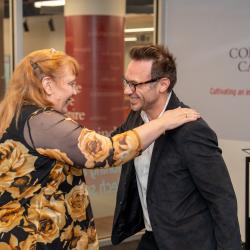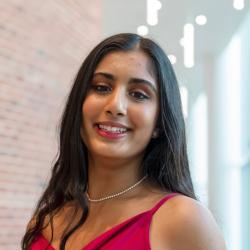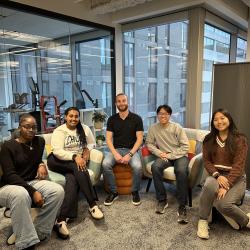Building Bridges
 University of Maryland astronomy graduate student Ashlee Wilkins looked down at her phone. Staring back at her was a young man smiling in a lab at Harvard University. Only weeks before, Raphael Outlaw, who had just received his associate’s degree from Baltimore City Community College, told Wilkins he was intimidated by an offer to conduct research at such a prestigious university. Looking at the picture, Wilkins felt a swell of pride. Not only had Outlaw accepted the offer, but the letters GRAD-MAP now peeked out from under his lab coat in the photo.
University of Maryland astronomy graduate student Ashlee Wilkins looked down at her phone. Staring back at her was a young man smiling in a lab at Harvard University. Only weeks before, Raphael Outlaw, who had just received his associate’s degree from Baltimore City Community College, told Wilkins he was intimidated by an offer to conduct research at such a prestigious university. Looking at the picture, Wilkins felt a swell of pride. Not only had Outlaw accepted the offer, but the letters GRAD-MAP now peeked out from under his lab coat in the photo.
GRAD-MAP, which stands for Graduate Resources Advancing Diversity with Maryland Astronomy and Physics, is a program close to Wilkins’ heart. A founding member of the UMD student organization, Wilkins says she and fellow graduate students noticed a lack of diversity within the fields of astronomy and physics and wanted to change that.
“We wanted to bring together faculty members and students at Maryland and local historically black colleges and universities to start thinking about climate and student experiences,” says Wilkins. “We also wanted to learn more about admissions practices and examine whether the metrics being used measured an undergraduate’s true ability to become a competent scientist.”
Since its start in 2013, the GRAD-MAP program has helped dozens of students from groups traditionally underrepresented in the sciences who attend minority-serving institutions gain the research experience and skills required for graduate school.
The program mentors approximately 10 students a year through its winter workshop and reaches out to additional students with its seminar series and summer events. Through these opportunities, students visit university and federal laboratories, learn about UMD faculty member research projects and receive specialized training in skills such as programming languages.
Three years since the program’s inception, Wilkins considers it a success. Twenty-seven students have completed the winter workshop, and four of them returned to College Park this summer to work in the Department of Astronomy as part of the first cohort of GRAD-MAP Summer Scholars.
“It’s about supporting the development of a student’s ‘science identity’ in multiple ways and spaces, which requires them to experience situations where they have to prove themselves as scientists and be positively affirmed of their abilities,” says Wilkins.
In addition to her GRAD-MAP leadership, Wilkins has collaborated with Stuart Vogel, chair of the Department of Astronomy, to modify the department’s BANG (Better Astronomy for a New Generation) career seminar to include speakers and discussions on diversity and equity, as well as career paths and professional development.
“A lot of people think the terms diversity and excellence are at odds with one another or that it means you’re lowering the standards,” says Wilkins. “However, that’s not true—it actually makes for better science when you have a diverse group of scientists.”
Wilkins isn’t content to impact equity and inclusion at the departmental level only. Eager to explore these issues throughout UMD and apply lessons she has learned through GRAD-MAP, she was elected Graduate Student Government vice president of academic affairs and became a member of the University Senate’s Equity, Diversity, and Inclusion Committee.
This past year, the senate committee proposed changes to the university’s nondiscrimination and accessibility policies. Wilkins also helped write a new policy to support students who want to designate a pronoun or noun in their student record that is different than the gender identity recorded on their birth certificate.
“We addressed concerns of communities that are not often addressed,” says Wilkins. “They don’t have as loud of a voice, and we were able to learn from all sorts of different entities on campus.”
Wilkins’ efforts to improve equity and equality go beyond her work in her department, her university and her community. She hopes that her career will help to generate diversity within science, ultimately creating better science.
Written by Rachael Romano
This article was published in the Fall 2016 issue of Odyssey magazine. To read other stories from that issue, please visit go.umd.edu/odyssey.







